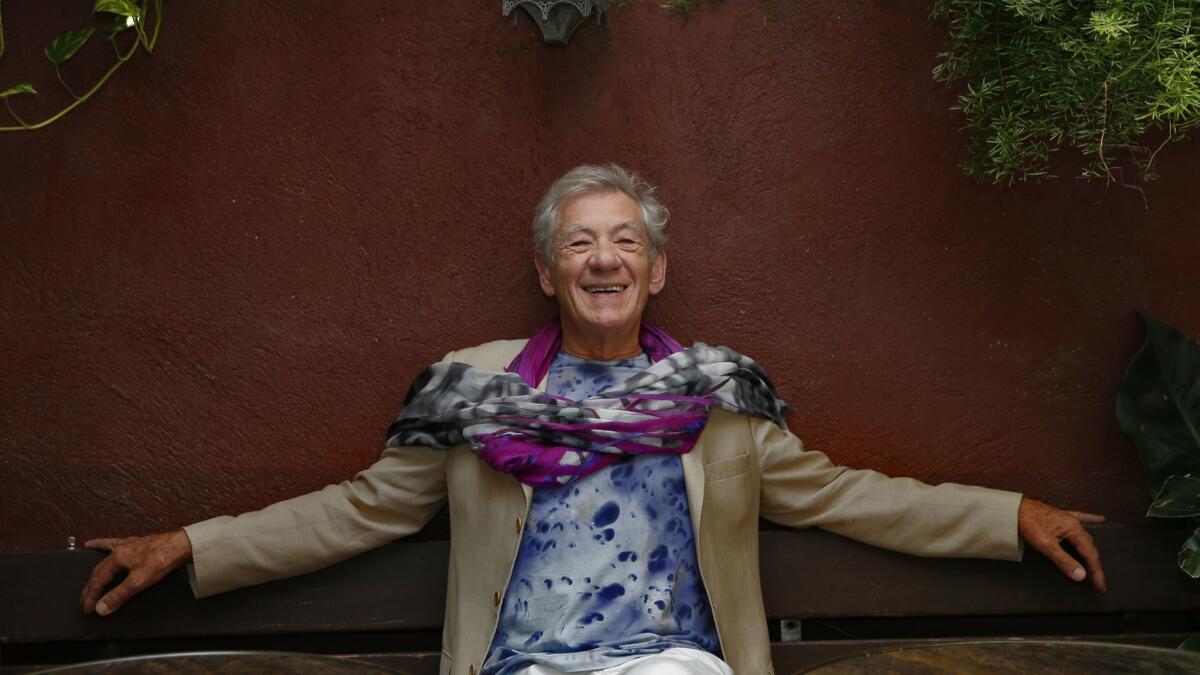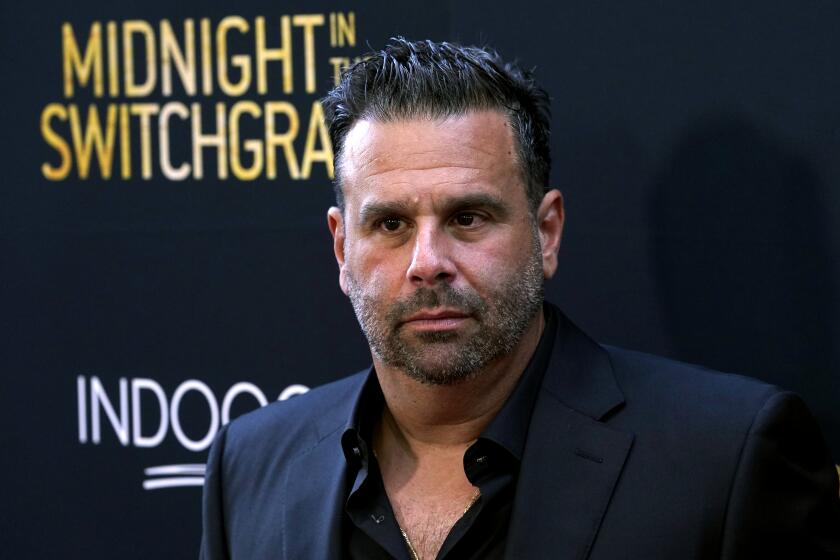Ian McKellen reflects on an unconventional career laid bare in the documentary ‘Playing the Part’
- Share via
Reporting from London — The life and work of Ian McKellen are at the heart of Joe Stephenson’s documentary “McKellen: Playing the Part,” which follows the 79-year-old British actor from his early years. The documentary, which begins select theatrical engagements June 19, examines McKellen’s career, both in theater and film, as well as his work as an activist for gay rights in the U.K.
The actor came out as gay in 1988 during a BBC Radio 3 interview and has since been deeply outspoken about the need for equality in life and its on-screen reflections. He subsequently earned two Oscar nominations (in 1999 for “Gods and Monsters” and 2002 for “The Lord of the Rings: The Fellowship of the Ring”) and appeared in films ranging from the “X-Men” franchise to Disney’s recent mega-hit “Beauty and the Beast.”
He’s currently filming “The Good Liar” opposite Helen Mirren in London, where The Times spoke with McKellen, who is also preparing to play the lead in “King Lear” at the Duke of York Theater beginning July 12, about looking back over his career.
Why did you agree to this documentary?
I had just decided not to write my autobiography and so I thought, “Well, if this all works out maybe it’s some sort of substitute.” I didn’t have very high expectations, but I was happy to help a friend so I sat there for three or four days answering his questions. It’s very much his take on me. But I’m very pleased with it.
Did you learn something new about yourself in the process?

I’m not sure I did, really. What’s tricky in talking about yourself, which the film explores a little bit, is what side of yourself you’re showing. All you can do is make it very personal and speak to the person behind the camera, rather than imagining that anyone else is going to ever hear what you’ve said. I was reassured that when I saw the film it added up to a story that didn’t surprise me. When I started acting I always wanted to have a career and to work over a number of years and develop during that time, and the film seems to confirm that. But it was more of a confirmation than a discovery, I think.
Did you already know that your gay rights activism was such a large part of your narrative?
Yes. When we were all fighting the government here on specific and general issues I knew it. It wasn’t necessarily a very popular thing to be doing, although it gradually did become so. Nothing that we were saying in the 1980s seems too remarkable now. At the time one had very little support from the media, from newspapers, who were, on the whole, very homophobic. But it’s been a wonderful thing in my life because it’s introduced me to all sort of people I wouldn’t otherwise have met, particularly a lot of women. Learning from them how to change attitudes and change laws has been extremely gratifying. It does look like ancient history when you see the battles we were fighting not that long ago. And, of course, those are battles that are still being fought around the world.
Do you feel that progress has been made in Hollywood when it comes to LQBTQ actors and characters?
There have been some wonderful films of late treating gay people as ordinary people and their problems and their delights as human activity rather than gay activity. Unfortunately one has never looked toward the film industry for social advance, whether you look at it from a woman’s point of view or a black person’s point of view or a gay person’s point of view. Hollywood is beginning to catch up. You can’t really criticize show business too much because on the whole it reflects the times rather than leads. But these days I think a gay story is much more likely to make it to the mainstream than in the past. And that’s a good thing.
Are there any recent films that you’ve found to be a particularly positive representation of the gay experience?
I very much liked “God’s Own Country.” That, I thought, was absolutely astonishing and believable. The end of the film could have gone either way and I was almost shouting at the screen “Oh, please let them be all right!” It was a gay story with a happy ending and there have been far too many stories in the past where it ended in death or suicide or some other misery. And of course the more popular film “Call Me by Your Name” was a very moving story.
Do you find it ironic that you became a bigger film star after you came out?
No. Because I don’t think audiences care a damn. Why would they? When it was announced that I was going to play Gandalf [in “The Lord of the Rings” trilogy] people knew I was gay and some people reacted. There were jokes on the internet about “Gandalf the Gay.” And a few said, “It’s absolutely impossible – I can’t imagine Gandalf being played by a gay man.” But why? Why can’t you imagine it? What a poor imagination you’ve got.
So it didn’t matter at all and it doesn’t matter now. I rather like the cheek of it, that I’ve played a character who is very, very popular amongst people between the ages of 7 and 15 who society’s been trying to protect from the knowledge of homosexuality.
I see, probably, why I achieved a bigger success once I’d come out and it’s because I’d become a better actor. You become better in every possible way. You become a better person, a better friend, a better family member and you get better at your job because you’re not worried about things that don’t matter, like your sexuality. As an actor that’s very freeing. So maybe there’s some connection there between success and coming out.
At this point what is it that keeps you wanting to act?
It’s probably wanting to keep healthy. You can’t act on the stage unless you’ve got a physical and mental and emotional energy. Of course at my age all those aspects of your life can be frail and can begin to go. As I’m still mobile and can still remember lines it’s a good challenge. One day soon something will happen and I won’t be able to do it anymore. The knees will give way or the mind will give way and I’ll be sitting around sleeping or contemplating. But in the meantime why not do the thing I’m good at and that people enjoy seeing me do? It makes you feel like your life still has a purpose.
More to Read
Only good movies
Get the Indie Focus newsletter, Mark Olsen's weekly guide to the world of cinema.
You may occasionally receive promotional content from the Los Angeles Times.






